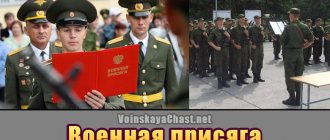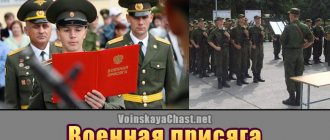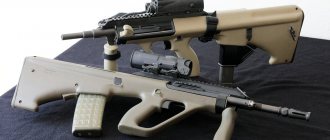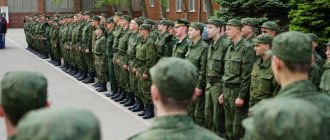Discipline is the most important quality of a warrior’s personality
Discipline is a certain order of people’s behavior that meets the established norms of law and morality in society, as well as the requirements of a particular organization. In accordance with the spheres of manifestation, it can be divided into state, industrial, social, technical, military, etc.
The essence and content of military discipline
The modern Military Encyclopedic Dictionary defines military discipline as “strict and precise observance by all military personnel of the order and rules established by laws, military regulations and orders of commanders (chiefs).” This is also written in the Disciplinary Charter of the Armed Forces of the Russian Federation. This means that the starting point, both in understanding discipline and in ensuring it in everyday practice, is the rules of conduct of a military personnel.
Discipline is based on each serviceman's awareness of his military duty and personal responsibility for the defense of the Fatherland. It does not infringe upon individual rights and does not reject initiative. Discipline ensures the cohesion of military personnel and their readiness to carry out the tasks facing the troops. Therefore, military discipline is:
firstly, soldiers’ knowledge of the laws and statutory requirements governing military service;
secondly, their precise, strict and conscious execution.
High military discipline is one of the decisive conditions for the combat effectiveness of troops, the most important factor ensuring victory on the battlefield. History does not know a single commander, a major military leader, who would not care about strengthening discipline, organization, efficiency and order in the army. So, for example, A.V. Suvorov saw discipline as the basis of military valor, courage, and heroism and called it the mother of victory. The discipline of P.A. was called the soul of military service. Rumyantsev and M.I. Kutuzov. Military theorist M.I. Dragomirov emphasized that “military discipline is the totality of all moral, mental and physical skills necessary for officers and soldiers of all levels to meet their purpose...”. Many statements about the role and importance of military discipline are also contained in the works of commanders M.V. Frunze, G.K. Zhukov, AM Vasilevsky, K.K. Rokossovsky and others.
The entire heroic history of the Russian Armed Forces convincingly demonstrates that feat begins with discipline. Thousands of soldiers performed heroic deeds during battles, showing loyalty to the military oath, high diligence and responsibility for fulfilling their military duty.
Modern warfare involves the use of previously unprecedented means of armed struggle. Combat operations in such a war will involve enormous physical and moral stress and rapid changes in the situation. The direct responsibility of each military personnel in these conditions is the rational use of training time, saving money and resources, constantly searching for and mastering such forms and methods of study that would best meet modern requirements. Fulfilling these tasks is impossible without strong military discipline.
In addition, mastering modern methods of warfare, the latest weapons and military equipment, the ability to fully use their combat power requires strict adherence to military regulations, coordinated actions of a large number of soldiers of various specialties, organization, technical literacy, coherence, clarity, attentiveness, impeccable performance. Being an important component of the combat readiness of subunits, units, ships, military discipline turns army and navy teams into a single, strong, cohesive organism, capable of acting quickly and accurately in any situation. Military and naval life confirms: where military discipline is stronger, the effectiveness and quality of combat training is higher.
That is why every soldier is obliged to be not only honest and brave, but also disciplined.
Today, to be disciplined means to conscientiously and honestly fulfill the requirements of military regulations, to unquestioningly and accurately carry out the orders of commanders and superiors.
The personal discipline of each warrior is a socio-psychological and moral trait of his personality, manifested in a respectful attitude towards the laws of the state, the norms of society, the rules of community life and military duty. It expresses his readiness for self-sacrifice in the armed struggle for the security of the Motherland.
A warrior's discipline can be conscious if it is based on the motives of patriotism, duty, honor and high internal responsibility. It is not conscious if it is dictated by fear of punishment, considerations of profit, or other similar incentives. The structure of discipline has two important components: self-discipline and diligence.
If a serviceman’s behavior is determined solely by an understanding of norms and rules that do not require any reminders, this is self-discipline.
The correct behavior of a warrior, which is guided by remarks, commands, orders of commanders and is implemented on the basis of obedience, is diligence.
Discipline is especially important in combat conditions, when the slightest violation can lead to failure to complete the assigned task.
The concept of “military discipline” includes:
— the mandatory nature of its requirements for all categories of military personnel;
— coincidence of the goals of legality and military discipline;
— detailed regulation of rules of conduct for the entire range of types of military activities
— increased legal liability for violation of the order and rules of military service;
— mandatory compliance with moral standards, supported by statutory requirements;
— disciplinary liability for violation of rules and norms not only in an official, but also in an off-duty environment;
— unity of unconditional fulfillment of established norms and manifestation of activity, independence, creativity, etc.
Military discipline is designed to regulate military order, relationships between military personnel, relationships in units in order to ensure high organization and combat effectiveness. It creates a healthy moral and psychological climate in the military team, ensures high controllability of units and makes it possible to use time, weapons, material resources and human forces with the greatest efficiency to solve problems in peacetime and in combat.
An army cannot exist without discipline. Military labor and the specifics of military service require strict regulation of the activities and behavior of military personnel. Military discipline is the basis of the combat readiness of the Armed Forces.
With the help of discipline, coordination of actions is achieved, subordination and comradely mutual assistance are ensured. Its observance makes it possible to sum up the efforts of many people and is an effective means of social management.
The main core of military discipline is unquestioning obedience, accurate and timely execution of orders and instructions. Its essence is knowledge of the rules of behavior and established order, understanding of their necessity and a stable habit of observing them. The condition for compliance with the requirements of discipline and its result is the personal discipline of the warrior.
The main directions of formation of discipline among military personnel
Discipline is the requirements of military discipline, the fulfillment of which is a deep internal need for a serviceman, a stable habit of complying with all norms and statutory provisions. This is a manifestation of the serviceman’s responsibility for his actions before the law, consciousness, understanding of the need to subordinate his actions to the will of the commander, personal interests - the interests of the combat readiness of the unit, unit, ship.
Thus, we can conclude that the concept of “discipline” is a specific quality of a warrior that ensures stable, rule-compliant behavior during military service. It is characterized by external and internal indicators.
External indicators of discipline:
- strict adherence to military order;
— accurate and proactive implementation of orders and instructions from commanders and superiors;
— careful attitude towards military equipment and weapons, their competent use in solving combat training and service tasks;
- exemplary appearance. Internal indicators of discipline:
- conviction in the necessity and expediency of military discipline
— knowledge of regulations and instructions, requirements of military service;
— the ability to manage oneself in accordance with the requirements of military discipline;
— skills and habits of disciplined behavior;
- self-discipline.
Such a quality as discipline is not born with a person, and especially not given to a warrior with shoulder straps. It is formed and developed in the process of army life and activity.
Throughout his service, a soldier must engage in self-education of discipline. It represents the purposeful activity of a serviceman, contributing not only to strengthening or weakening certain qualities of his personality, but also to the formation of those that he previously lacked.
Where to start developing self-discipline? First of all, you need to ask yourself the following questions: “Do my commanders have many complaints against me? What do they basically boil down to? Why is this happening?" By answering them, you can draw conclusions for yourself about what personal disorganization, inability to manage your time, superficial knowledge of statutory requirements, and inability to force yourself to conscientiously fulfill official duties lead to.
It is important that every serviceman understands that developing qualities that meet the interests of the service, the requirements of the oath and regulations, is not an end in itself, but an urgent need of the army way of life.
How to develop the ability to self-esteem? You can learn a lot by following the examples of commanders and colleagues, and by respecting the traditions established in the unit. Good results come from mutual assessments and mutual characteristics. Evaluating his comrades during collective events, one or another soldier involuntarily compares (identifies) himself with other people and accordingly evaluates his actions and actions. Works of literature, radio and television programs, films and videos provide great assistance in the development of self-esteem.
A higher level of self-awareness is self-analysis. This is a military personnel’s mental division of their activities, actions, and behavior into separate components and their fundamental assessment. A simple statement—“am I good or bad”—should not satisfy a serviceman. He must strive to get an answer to what he is bad at, why things are like this, and how to correct this situation. It is important that self-analysis concerns both negative aspects of work activity and positive ones. In this case, the person will not withdraw into himself, will not experience complexes, but will try to deal with shortcomings on his own. It is important to learn to find the reasons for your own failures and be able to draw practical conclusions from this.
In working on oneself, self-control is of great importance - the ability to critically look at one’s actions through the prism of the requirements of statutory norms, notice shortcomings and mistakes, and find ways to correct them. It has been noticed that the higher the demands on each other in the team, the higher each member of the military team places it on himself. When self-control, endurance and self-control are important, as well as the ability to suppress impulses and actions that contradict established norms of behavior. It is these qualities that underlie the moral and volitional stability of a serviceman. A solid statutory order in the unit, a streamlined combat training process, and vigilant guard and internal service actively influence their development.
The defining components of self-awareness that contribute to the self-education of discipline are an ideal, a dream, a life goal, interests, which, like a compass, help a person navigate in life and do not allow him to stray from the course. Military personnel's awareness of their importance becomes a powerful incentive to work on themselves. What methods are suitable for instilling discipline?
This is self-exercise, self-persuasion, self-hypnosis, self-coercion (see diagram).
Self-exercise is the conscious repeated execution of planned actions in order to develop certain qualities, character traits, skills and abilities. As a rule, it manifests itself in the following sequence:
— analysis and assessment of the qualities and skills of one’s behavior;
— developing a mindset for action;
- losing the action to oneself;
- performing it in parts or as a whole;
— self-monitoring and evaluation of one’s actions, self-tasks for repetition, improving their quality.
Self-persuasion helps in justifying actions and actions. At the same time, arguments and counter-arguments are given, they are tested in practice. Self-conviction often manifests itself in the form of internal polemics, an argument with oneself. It can also be carried out in the form of self-explanation, self-proof, self-refutation, self-criticism, self-consolation, self-condemnation.
Self-hypnosis manifests itself in influencing oneself with a short verbal formula in order to control one’s mental and physical state. For example: “don’t chat,” “don’t flail,” “tense up,” “you still have strength.” In this way, states of strong nervous excitement, physical fatigue, and many difficulties are overcome, and weaknesses and shortcomings in behavior are eradicated.
Self-coercion consists of the manifestation of volitional efforts to perform actions and deeds that meet the requirements of regulations, established norms in military and public duty, as well as personal rules and obligations. Any act of self-coercion begins with an understanding of the task, an assessment of one’s readiness to carry it out, and a motivated self-setting for volitional actions. Self-coercion is stimulated by demanding self-control, self-persuasion, self-approval, or self-condemnation. At the same time, it is important to evaluate your actions and the results obtained, and aim yourself at high-quality implementation of new, more complex tasks.
The increasing role of military discipline and the discipline of military personnel in modern conditions is obvious. And constant work to improve their quality level is an objective necessity, both for each military personnel and for the Armed Forces of the Russian Federation as a whole.
Recommended reading:
1. You must be a citizen: About the history of the Russian state and its armed forces, traditions, moral, psychological and legal foundations of military service. / Ed. S.N. Erlika, V.N. Ivanova, VV. Marushchenko.
2. In the service of the Fatherland: About the history of the Russian state and its armed forces, traditions, legal and moral-psychological foundations of military service. — M.: Ministry of Defense of the Russian Federation, Main Directorate for Internal Affairs of the Armed Forces of the Russian Federation, IVI, Higher Education Institution of the Ministry of Defense of the Russian Federation. -1998.
3. General military regulations of the RF Armed Forces. - M.: Military Publishing House. -1994.
4. Utlik E.P. Psychological foundations of the discipline. - M.: Ministry of Defense of the Russian Federation, Main Directorate of Internal Affairs of the Armed Forces of the Russian Federation. -1993.
Lieutenant Colonel Alexey Nikishov. Major Oleg Samosvat
“Landmark” 2007.08
Tags: UCP
KOMISAR.RF
Class:A story is a conversation.
Learning objectives:
1. Explain the essence and content of issues of military discipline in the Armed Forces. 2. The importance of military discipline and professionalism in modern conditions.
Time spending:
00.00 – 00.00.
Venue: Logistics and technical support:
visual aids.
Progress of the lesson
Introductory part -
10 minutes. Monitoring the readiness of students to conduct classes. Presenting the objectives of the lesson and issues to be discussed. Information before class.
Main part -
90 minutes
- The essence and content of military discipline.
- Military discipline and professionalism, their importance in modern conditions.
Military discipline as an integral part of state discipline is one of the fundamental factors in the combat readiness of troops. The importance of military discipline and organization, strict statutory order in units and on ships increases immeasurably in the conditions of the active transition of the army and navy to new qualitative parameters. Strong military discipline and organization are formed by the entire structure of military service.
1.
The word discipline was first mentioned in the decree of Peter I on the conscription of foreigners to Russia (1702), who were supposed to help “so that our armies were composed of people who knew military affairs and maintained good order and discipline.” The word “discipline” began to be used as a synonym for order and obedience.
Over the course of the centuries-old history of the Russian state, approaches to the concept of discipline have changed. Military discipline was initially based on the idea of intimidation, severity and even cruelty. But already during the time of A.V. Suvorov, progressive military-pedagogical and legal views on discipline, on treating the soldier as a person, whose mind and will were assigned a decisive role in ensuring ultimate success in battle, are increasingly penetrating the Russian army.
In the Russian, as well as in a number of advanced European armies, great attention was paid to the problem of troop discipline. From about the middle of the 19th century, military tactics began to undergo serious changes caused by technological progress, which in turn led to an increase in the role and importance of the individual officer and soldier on the battlefield. An increasing number of military leaders and theorists of military art are affirming their views on the discipline of a warrior as the result and state of his moral and spiritual forces, the degree of awareness and acceptance of the importance of obedience and unquestioning performance of duty in the name of the Fatherland.
The Disciplinary Charter of the Imperial Army stated: -Discipline consists of strict and precise adherence to the rules prescribed by military laws. Therefore, it obliges to strictly observe rank, accurately and unquestioningly carry out the orders of superiors, maintain order in the entrusted team, conscientiously fulfill the duties of the service and not leave the actions and omissions of subordinates without punishment.
There are many statements on this topic by the tsarist military leaders. “Military discipline is the totality of all the moral, mental and physical skills necessary to ensure that officers and soldiers of all ranks answer their purpose... Discipline is to bring to the light of God all that is great and all that is holy, lurking in the depths of the soul of the most ordinary man . (M. Dragomirov). “Without discipline, a person is first of all a coward and incapable of war (A. Kolchak). The Russian army corresponds to discipline, meaningful in essence, but rigid in form” (A. Kersnovsky). Outstanding Russian historian N.N. Golovin, emphasizing the role and importance of discipline in battle, wrote: A person fights not for the sake of fighting, but for the sake of victory. According to the Russian commander p.d. Rumyantsev, the educational system in the army should consist of the desire to establish reasonable discipline, a conscious attitude towards military duty, honor and the high calling of a warrior.
Already in that historical period, among the enlightened layers of Russian society and among the most advanced military personnel, the prevailing opinion was the need to carry out military reforms that would significantly improve military education, training and education of army personnel, and especially the lower ranks. Conscious and high discipline of soldiers and officers was proposed to be achieved as a derivative of purposeful education and development of such personal qualities as piety, faith, conscientiousness, spirituality, diligence, morality, responsibility, obedience, devotion, service, conscience, consciousness and honesty.
History does not know a single commander, a major military leader, who would not care about strengthening discipline, organization, efficiency and order in the army. A.V. Suvorov saw discipline as the basis of military valor, courage, and heroism and called it the mother of victory.
The discipline of P.A. was called the soul of military service. Rumyantsev and M.I. Kutuzov. Military theorist M.I. Dragomirov emphasized that “military discipline is the totality of all the moral, mental and physical skills necessary for officers and soldiers of all levels to meet their purpose...”. Statements about the role and significance of military discipline are contained in the works of commanders M.V. Frunze, G.K. Zhukova, A.M. Vasilevsky, K.K. Rokossovsky and others.
The entire heroic history of the Russian Armed Forces convincingly demonstrates that heroism begins with discipline. Thousands of soldiers performed heroic deeds during battles, showing loyalty to the military oath, high diligence and responsibility for fulfilling their military duty.
M.I. Dragomirov included in the content of military discipline: subordination to the superior, diligence, devotion to the commander, service, sovereign, Fatherland, subordination, veneration of rank. In the well-known requirements for a soldier, he put discipline and discipline in second place after devotion to the Motherland and self-sacrifice.
Discipline
- these are the requirements of discipline, the fulfillment of which has become a deep internal need for the serviceman, a stable habit of complying with all norms and statutory provisions. It is a manifestation of the warrior’s responsibility for his actions before the law, consciousness, understanding of the need to subordinate his actions to the will of the commander, personal interests - the interests of the combat readiness of the unit, unit, ship.
Thus, the concept of discipline is a specific quality of a warrior that ensures stable, rule-compliant behavior during military service. It is characterized by external and internal indicators.
External indicators of discipline:
- strict adherence to military order; — accurate and proactive implementation of orders and instructions from commanders and superiors; — careful attitude towards military equipment and weapons, their competent use in solving combat training and service tasks; - exemplary appearance.
Internal indicators of discipline:
— conviction in the necessity and expediency of military discipline; — knowledge of regulations and instructions, requirements of military service; — the ability to manage oneself in accordance with the requirements of military discipline; — skills and habits of disciplined behavior; - self-discipline.
Further development of military affairs, changes in the means and methods of conducting combat operations required greater organization, accuracy, and diligence from soldiers. In the conditions of modern war, when performing various types of service and combat missions, military personnel will have to face enormous physical and moral stress, the implementation of which is impossible without strong military discipline.
Military discipline
as one of the types of state discipline, it is designed to regulate military order, relationships between military personnel, relations in units in order to ensure high organization and combat effectiveness. Its difference from other types of state discipline (social, labor, financial, etc.) is due to the nature of military activity, which requires from the people carrying out it special composure, accuracy, diligence, restraint, mutual understanding, mobility, prompt execution of all orders and etc. The concept of “military discipline” includes: - the mandatory nature of its requirements for all categories of military personnel; - coincidence of the goals of legality and military discipline: - detailed regulation of rules of conduct across the entire spectrum of types of military activity; — increased legal liability for violation of the order and rules of military service; — mandatory compliance with moral standards, supported by statutory requirements; — disciplinary liability for violation of rules and norms of behavior not only in an official, but also in an off-duty environment; — unity of unconditional fulfillment of established norms and manifestation of activity, independence, creativity, etc.
Discipline is an expression of high morality leading to victory and achievement; the main requirement of duty, which consists in renouncing personal and pursuing a single (general) will, the implementation of unanimity; obedience to order and rules is obligatory for everyone; knowledge and constant performance of their duties.
Discipline is the cornerstone of the warrior spirit. It is composed of consciousness, voluntariness, legality, military education, obedience, subordination and honor for rank (the external manifestation of discipline). Discipline presupposes the need for: love for the Fatherland, initiative with the ability to obey, military camaraderie, courage, preservation of entrusted material property, military training, etc.
2
At the present stage of development of the Russian army and especially with the beginning of the current statehood (since the early 90s of the twentieth century), interest in the problem of discipline does not fade, but, on the contrary, is becoming increasingly relevant. This circumstance encourages the public, state and military authorities, educational institutions to look for ways and means to improve the situation in the field of army discipline.
An army cannot exist without discipline. Military labor and the specifics of military service require strict regulation of the activities and behavior of military personnel, clear subordination of their relationships, strict and precise compliance with the requirements of military regulations, orders, instructions and manuals, which distinguishes them from civil codes and norms. Military discipline is the basis of the combat readiness of the Armed Forces. It is no coincidence that she is called the mother of victory. Discipline unites people, increases their strength tenfold, helps them achieve their goals faster, with fewer losses and in a short time.
The experience of the history of past wars, including the Great Patriotic War, shows: to win, you need iron discipline. And vice versa: lack of discipline gives rise to disorder, disorganization, and in war conditions leads to unnecessary losses and defeat.
Nowadays, the role and importance of military discipline and professionalism are constantly increasing. Modern warfare involves the use of previously unknown powerful means of armed struggle. Combat operations in such a war are associated with colossal physical and moral stress and rapid changes in the situation. In conditions of constant combat readiness, the equipping of units and units with collective types of weapons and military equipment, the growth of their fire and marching capabilities, the process of deepening the specialization of army and navy labor is taking place, the nature of military activity and the tasks of combat training are becoming more complicated. The direct responsibility of every soldier and military team in these conditions is the rational use of training time, saving money and resources, and constantly searching for and mastering advanced forms and methods of combat training.
The essence of military discipline is set out in the Disciplinary Charter of the Armed Forces of the Russian Federation.
Article one of the Disciplinary Charter reads: “Military discipline is strict
and
strict observance by all military personnel of the order
and
rules established by the laws of the Russian Federation, general military regulations of the Armed Forces of the Russian Federation
and
orders of commanders (chiefs).”
Expanding this definition, it is necessary to emphasize that discipline does not aim to infringe upon individual rights and does not reject initiative or infringe on the personal dignity of a warrior. It ensures the cohesion of military personnel and their readiness to perform assigned tasks. Strict adherence to the prescribed rules only speaks of the serviceman’s deep understanding of the essence of military service, his consciousness, desire at any cost, regardless of dangers, at the risk of life, to carry out the order received from the commander (chief) and to fulfill his military duty.
Military discipline is based on each serviceman's awareness of military duty and personal responsibility for the defense of his Fatherland, on his selfless devotion to his people.
Thus, we can say that the essence of conscious discipline consists in knowledge of the rules of behavior and established order, understanding of their necessity and an established, sustainable habit of observing them. The condition for compliance with the requirements of discipline and its result is discipline as a quality of a warrior’s personality.
Military discipline is one of the most significant aspects of the activities and communication of military personnel. High responsibility, consciousness, initiative and creativity of each military personnel make military discipline and organization an important component of the combat readiness of the Armed Forces. Even such an element of the army’s combat readiness as technical equipment can be fully demonstrated only thanks to the discipline, organization, and diligence of each soldier. Discipline is one of the determining factors in the military way of life and combat training activities, operation and use of collective types of weapons and military equipment.
In the current conditions, when new demands are placed on the combat readiness of the Armed Forces, the content of military discipline has firmly included such forms of its manifestation as time discipline, management discipline, discipline of competent operation of military equipment, technical discipline, march discipline, combat duty discipline, etc. . This differentiation of military discipline helps to a certain extent to concretize the work to strengthen it. However, military discipline is unified in its essence, covers all aspects of the life and activities of military personnel, and absorbs the requirements of the military oath, military regulations, manuals and instructions. The main core of discipline is unquestioning obedience, accurate and timely execution of orders and instructions.
Solving modern tasks of the Russian Federation Air Force is impossible without strong military discipline and professionalism. Mastery of modern combat techniques, the latest weapons and military equipment, the ability to fully use their combat power requires strict adherence to military regulations, coordinated actions of a large number of soldiers of various specialties, organization, technical literacy, coherence, clarity, attentiveness, and impeccable performance. Being an important component of the combat readiness of subunits, units, ships, military discipline turns army and navy teams into a single, strong, cohesive organism, capable of acting quickly and accurately in any situation. Military and naval life confirms: where military discipline is stronger, the effectiveness and quality of combat training is higher.
Final part
- 10 minutes. Summing up the lesson Answers to questions that arose during the lesson Recommendations for further independent study of the topic, self-study assignment.
Chief _________________ Major S. Sidorov
"____" March 2016









